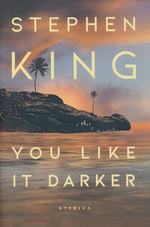
You Like It Darker: Stories (HC) (King, Stephen)
“You like it darker? Fine, so do I,” writes Stephen King in the afterword to this magnificent new collection of twelve stories that delve into the darker part of life—both metaphorical and literal. King has, for half a century, been a master of the form, and these stories, about fate, mortality, luck, and the folds in reality where anything can happen, are as rich and riveting as his novels, both weighty in theme and a huge pleasure to read. King writes to feel “the exhilaration of leaving ordinary day-to-day life behind,” and in You Like It Darker, readers will feel that exhilaration too, again and again. “Two Talented Bastids” explores the long-hidden secret of how the eponymous gentlemen got their skills. In “Danny Coughlin’s Bad Dream,” a brief and unprecedented psychic flash upends dozens of lives, Danny’s most catastrophically. In “Rattlesnakes,” a sequel to Cujo, a grieving widower travels to Florida for respite and instead receives an unexpected inheritance—with major strings attached. In “The Dreamers,” a taciturn Vietnam vet answers a job ad and learns that there are some corners of the universe best left unexplored. “The Answer Man” asks if prescience is good luck or bad and reminds us that a life marked by unbearable tragedy can still be meaningful. King’s ability to surprise, amaze, and bring us both terror and solace remains unsurpassed. Each of these stories holds its own thrills, joys, and mysteries; each feels iconic. You like it darker? You got it.
Udgivet af Scribner
Stephen King
Stephen Edwin King (born September 21, 1947) is an American author of contemporary horror and suspense fiction; he has also written sci-fi and fantasy novels. When King was two years old, his father, who was a merchant seaman, left the family under the pretense of "going to buy a pack of cigarettes," leaving his mother to raise King and his adopted older brother David by herself, sometimes under great financial strain.
As a child, King apparently witnessed one of his friends being struck and killed by a train, though he has no memory of the event. His family told him that after leaving home to play with the boy, King returned, speechless and seemingly in shock. Only later did the family learn of the friend's death. Some commentators have suggested that this event may have psychologically inspired some of King's darker works, but King himself has dismissed the idea.
King's primary inspiration for writing horror fiction was related in detail in his 1981 non-fiction Danse Macabre, in a chapter titled "An Annoying Autobiographical Pause". King makes a comparison of his uncle successfully dowsing for water using the bough of an apple branch with the sudden realization of what he wanted to do for a living. While browsing through an attic with his elder brother, King uncovered a paperback version of an H. P. Lovecraft collection of short stories that had belonged to his father. The cover art—an illustration of a monster hiding within the recesses of a hell-like cavern beneath a tombstone—was, he writes,
“the moment of my life when the dowsing rod suddenly went down hard ... as far as I was concerned, I was on my way.”
More than 350 million copies of King's novels and short story collections have been sold, and many of his stories have been adapted for film, television, and other media. King has written a number of books using the pen name Richard Bachman, and one short story, "The Fifth Quarter", as John Swithen. In 2003 the National Book Foundation awarded King the Medal for Distinguished Contribution to American Letters.
He and his wife own and occupy three different houses, one in Bangor, one in Center, Lovell, Maine, and they regularly winter in their waterfront mansion located off the Gulf of Mexico, in Sarasota, Florida. He and Tabitha have three children and three grandchildren.

